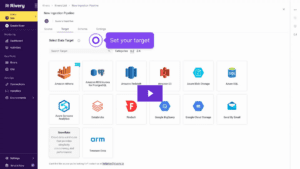DataOps Checklist for Digital Agencies
In today’s fast-moving market, digital agencies must build data operations that can adapt quickly and deliver the right data, at the right time, for the right stakeholder.
Whether producing client reports, sharing campaign insights, or streaming data to stakeholders in real-time, digital agencies need a data operation that can handle data demands in minutes, rather than weeks or months.
In other words, digital agencies need DataOps.
DataOps is an agile framework that combines technologies, processes, principles, and personnel to speed up the development and deployment of automated data workflows. By combining agile development, DevOps, personnel, and technology, DataOps delivers high-quality, on-demand data to agency stakeholders when, where, and how they need it.
For years, many digital agencies assumed that DataOps was the domain of enterprise data teams. But with new DataOps platforms, ones that offer both enhanced capabilities and lower barrier-to-entry, agencies can now adopt DataOps frameworks to outcompete the rest of the industry.
Another moment of disruption has arrived, and agencies that leverage the right DataOps solutions will thrive in this new environment. Which side will your agency be on? We’re here to help.
Here’s a checklist of nine “must-have” DataOps capabilities for digital agencies.
What Digital Agencies Need in a DataOps Solution

To achieve the speed associated with DataOps, digital agencies must harness pre-built, plug-and-play data connectors. The alternative – building data connectors over the course of weeks and months – is not remotely scalable for a DataOps operation. The data needs of clients and stakeholders can change at the snap of a finger, and that’s why agencies must utilize pre-built connectors to get up-and-running immediately.

Even the most robust DataOps platform will lack data connectors for certain data sources. That’s why it’s important to use a platform with custom API capabilities. With this functionality, teams can quickly build connectors for custom data sources. So, the next time a client asks for a data source nobody has ever heard of, build a data connector using the custom API, rather than building the connector from scratch.

For many agencies, accessing and analyzing data in real-time is essential. And in certain campaigns, such as for sporting events, getting the data for ads and customer interactions several hours later is not helpful. That’s why digital agencies should look for a DataOps platform with Webhooks functionality. Webhooks can deliver data to agency stakeholders right away, rather than during pre-scheduled intervals

Digital agencies often must store a client’s private account credentials to access data sources. This complicates projects, and creates a serious security burden for organizations that are designed to be nimble. But certain DataOps platforms allow clients to provide their credentials via direct, private links to data sources. That means agencies never actually have to handle client credentials, eliminating the inherent security risks, while still gaining access to client data. .

Certain clients, especially enterprises, maintain strict governance and security policies that many agencies are incapable of fulfilling. However, with programmatic data modeling, digital agencies can meet these stringent requirements by rendering data pipelines and other data components to infrastructure as code (IaC). This enables enterprise clients to monitor the entire DataOps process, at the code level, satisfying rigorous data policies that agencies typically cannot meet.

With so many different clients, and so many different data sources, digital agencies need to minimize manual work to power speedy, agile DataOps frameworks. Master data pipelines eliminate manual pipeline duplication by enabling agencies to deploy one data pipeline per source source to manage different accounts. For instance, if 15 clients use Instagram, agencies can create one Instagram pipeline with 15 sub-configurations, as opposed to 15 separate pipelines. Master data pipelines keeps data organized, saves time, and improves project efficiency.

Agencies often juggle dozens and dozens of clients at a time. The data management process can quickly become chaotic if accounts aren’t siloed from each other. Environments enable agencies to build separate data workspaces for each client, so there’s no “wire crossing” between all the different accounts. Agencies can manage client data more effectively, implement changes quicker, and execute client projects more efficiently.

A huge factor in agency data management is formatting raw data to meet client requirements for delivery, insights, and reporting. That’s why any agency DataOps solution must include a strong transformation engine. Find a solution that performs SQL-based transformations directly in-database, automates full logic workflows, and sends data to clients via actions. Also, DataOps solutions based on ELT can load and transform data into a cloud data warehouse simultaneously, leading to faster data projects.

Each client has a unique use case, and launching each specific data operation is often a difficult, time-consuming process. That’s why agencies should turn to pre-built Kits, a.k.a. instant data models, to launch client data operations immediately. Kits are pre-packaged, full-scale data models – including ingestion, transformation, and orchestration – designed for common use cases and deployed at the click of a button. Digital agencies can also customize Kits to meet the distinct needs of their client. Kits offer immediate time to value, and boost the speed and efficiency of data projects.
The Future is Here
The Time For Agencies to Act Is Now
For agencies, DataOps is not on the horizon.
The word may conjure giant enterprises, but the principles of DataOps are already seeping into data management for agencies. Some top agencies have already implemented DataOps frameworks, or at least capabilities, into their data operations.
This is a chance to seize the moment. Now is the time to jump ahead of the pack. Start building a DataOps framework for your digital agency today!
If you have any questions, or want to talk, about how DataOps can impact your digital agency, feel free to reach out to our DataOps experts!

